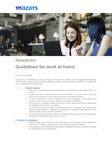
Guidelines for work at home
Last June 2, the Ministry of Labor by means of Circular 041 of 2020, set some guidelines regarding work at home, a figure that as already indicated, is different from teleworking. Within such guidelines are the following to be highlighted:
I. General aspects:
- Labor, union and social security guarantees are maintained for those who work from home.
- People who work at home will perform their activities in a similar manner to those they regularly perform in their regular job and on the same schedule.
- In case of performing functions different from those assigned in the employment contract, there must be a mutual agreement between the parties.
- There can be no unilateral salary reductions, under the pretext that the activity will be developed from home or remotely.
- For the monitoring of the tasks to be performed by the worker, the instruments, frequency and model of evaluation and approval or feedback regarding the report and/or results of these must be specified.
- During the period of work at home, the disciplinary procedure known by the parties (employee and employer) will remain in force.
II. Wolking Time Aspects:
- Work at home must comply with the labor provisions contained in the Substantive Labor Code, including, among others, the maximum workday allowed.
- The employer must maintain the time periods established by law in its work schedule for workers who are breastfeeding.
- Employers and workers must adhere to the work schedule and working hours, to guarantee the right to digital work disconnection and avoid the impacts that may be generated in the mental health and emotional balance of workers.
- When at the employer's request, the work at home must be developed in a working day longer than that provided for in Article 161 of the Substantive Labor Code, the payment of overtime and surcharges for work on Sundays and holidays, if applicable, will be applicable.
- It should be noted that in no case may overtime work, day or night, exceed two (2) hours per day and twelve (12) hours per week. When the working day is extended by agreement between employers and workers to ten (10) hours per day, overtime may not be worked on the same day.
- Employers must promote spaces that allow the worker to take active, hygienic and health protection breaks, as well as a minimum rest between continuous meetings.
- The employer shall ensure that the working hours per day are distributed in at least two sections, with a rest break in between. However, by consensus between the parties, they may be accumulated at lunchtime to facilitate the preparation of food and the development of family life.
III. Harmonization of work life with family and personal life:
- The parties may agree on appropriate measures following the other guidelines established in this circular for workers who live with children, adolescents, family members and senior citizens, and perform their functions in the role of parents.
- Likewise, the right to rest, leisure and healthy entertainment must be respected through the strategies to be promoted by employers, which are essentially based on respect for the worker's free time. In this sense, on weekends and rest days, the request of tasks through e-mails or WhatsApp messages will be avoided.
IV. Aspects related to Occupational Risks:
- The employer shall include homework within its methodology for the identification, evaluation, assessment and control of hazards and risks in the company.
- It shall adopt the necessary actions within its annual Work Plan of the Occupational Safety and Health Management System.
- The employer must notify the Labor Risks Administrators of the temporary execution of activities of the worker from home, indicating the conditions of mode, time and place.
- The Labor Risks Administrators will include work at home within their promotion and prevention activities. Likewise, they will provide support to the employer on the implementation of active breaks, which must be included in the workday in a virtual manner, either through videos or video conferences.
- The Labor Risk Management Company must send recommendations on posture and location of the elements used for the worker's work.
- The employer must follow up its workers on their health status and self-care recommendations to prevent the spread of Covid-19, according to the recommendations made by the different State entities within the protocols issued for this purpose.
- Employers must report accidents, work incidents and incapacities and, in general, comply with all the obligations established in article 22 of Decree 1295 of 1994.
- The employer must have and make known to the workers the communication mechanisms such as e-mails and direct telephone lines where they can report any type of news derived from the performance of their work at home.
- Likewise, it shall instruct workers on how to report accidents or work incidents.
- The ARLs shall adjust the FURATs to include the possibility of reporting work accidents occurring while working at home. Likewise, the Labor Coexistence Committee must have mechanisms to facilitate the reporting of complaints by workers.


